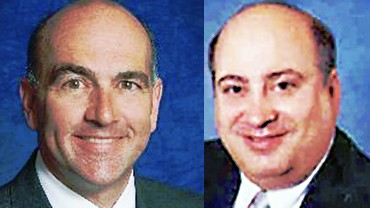
Greg Siskind (l); Barry Frager
President Trump’s executive order creating new immigration bans has not left Memphis unscathed. Among the affected are the proprietors of two local law firms specializing in immigration matters, although both see their clientele as being the true victims, not themselves.
“These are harsh actions by the Trump administration, and they are already affecting a lot of people, by their tone as much as by their action,” said Barry Frager of the Frager Law firm. “People will fear leaving the U.S. on trips, uncertain as to whether they can get back. All this is increasing fear in the immigrant community as a whole, especially among the Muslim community.
Muslims constitute maybe 15 percent of his firm’s trade, said Frager. And he estimated that the effects of his practice would be a “wash,” given the balance between some emergency work that will come his way and the expected reduction in calls for the routine assistance that his firm provides — visas, green cards, and general compliance with a host of normal immigration requirements.
“Clearly, people will respond when they are afraid,” Frager said. “But under the Trump administration we do not expect a friendly environment where we’ll be able to help more people. I’m concerned that well be able to help less people be successful in matters affecting their status.”
Greg Siskind of Siskind Susser, another firm specializing in immigration matters, expressed similar thoughts. In the short term, “it’s not impacting us financially,” Siskind said of the Trump ban, which, for a projected 90-day period, has put a stop, regardless of visa category, to normal travel of non-citizens back and forth between the U.S. and seven Middle Eastern nations — Iran, Iraq, Yemen, Somalia, Suden, Libya, and Syria.
The Trump ban also includes an absolute 120-day halt to admission to the United States of refugees fleeing the consequences of the civil war in Syria.
Siskind estimates that his Muslim clientele constitutes “from 15 to 25 percent” of his firm’s total.
Amid impassioned protests at several American airport locations, a federal judge in Massachusetts on Saturday night ordered a stay in enforcement of the Trump ban that had the effect of freeing up several hundred non-citizens who had been blocked on their re-arrival in America from trips to several of the seven affected nations.
But that accomplished only partial relief, noted Siskind. “For every person who was stuck in the airport here, there are probably 100 people abroad who can’t get back in.” That included “dual nationals,” people with passports from Canada as well as from one of the affected nations. “We do a lot of work for doctors, and a lot of them are from Iran or Syria,” said Siskind. He estimated that “from 5 to 7 of the top 10” physicians’ cases that his firm handles involve immigrants from Syria.
Like Frager, Siskind is dubious about the constitutionality of Trump’s actions, which both lawyers saw as targeted at Muslims, despite pro forma denials from the administration. On the basis of such additional news as was available on Sunday, Siskind did express a hope that immigrants from the seven affected nations who already possess green cards might find the barriers to their travel relaxed.
Both Frager and Siskind held their optimism in check, however, pending further developments. Both were hopeful that legal actions from the A.C.L.U and other opponents of the ban could accomplish some relief, but both saw Senator Jeff Sessions, President Trump’s Attorney General-designate, as the animating source of the President’s action, and both feared the worst on that account.
Both lawyers were also dubious about Congress’ ability to affect the outcome.
Said Frager: “My feeling is that the establishment portions of both the Democratic and Republican parties don’t quite know what to do right now with Donald Trump’s Presidency. I believe that the establishment doesn’t agree with the Trump administration but doesn’t know what to do about it.”
Siskind has similar sentiments — with a pointed edge to them. “I’d like to see what Congress will do, but they, and the normal agencies of government, seem to be sidelined, including our two Senators,” he said on Sunday. “I know where [9th District Congressman Steve] Cohen stands.” (The Memphis Democrat is vehemently opposed to Trump’s action.} “I’d like to see where [Republican 8th District] Congressman [David] Kustoff stands. They’ll be judged for a lot of years on what they do in the next week or two.
“If Congress just stands by and lets this happen, it’s a bad sign for what we’re going to see for the next couple of years.”
For the record, Senator Lamar Alexander issued this statement later on Sunday:
“This vetting proposal itself needed more vetting. More scrutiny of those traveling from war-torn countries to the United States is wise. But this broad and confusing order seems to ban legal, permanent residents with ‘green cards,’ and might turn away Iraqis, for example, who were translators and helped save lives of Americans troops and who could be killed if they stay in Iraq. And while not explicitly a religious test, it comes close to one which is inconsistent with our American character.”